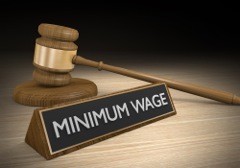 Businesses in Michigan that pay employees minimum wage should be prepared for the wage’s next round of increases, which are set to take effect Jan. 1, 2017 and increase 40 cents, from $8.50 to $8.90 an hour.
Businesses in Michigan that pay employees minimum wage should be prepared for the wage’s next round of increases, which are set to take effect Jan. 1, 2017 and increase 40 cents, from $8.50 to $8.90 an hour.
This increase marks the third step of a gradual 25 percent increase in the minimum hourly wage rate that began in 2014 and will culminate in a $9.25-per-hour rate in 2018.
Public Act 138, the Workforce Opportunity Wage Act of 2014, took effect in May of that year and replaced the Michigan Minimum Wage and Overtime Act. Known as WOWA, the act is enforced through the state’s Wage and Hour Division — an agency within the Bureau of Employment Relations.
The law applies to Michigan employers with two or more employees, age 16 and older. However, a provision in the act allows an employer to pay a newly hired employee, ages 16 to 19, an hourly rate of $4.25 for the first 90 days of employment.
WOWA does permit employers to pay 85 percent of the minimum hourly wage to employees ages 16 and 17. Employers covered by both state and federal minimum wage law must pay the higher of the two rates. The current federal minimum wage is $7.25.
WOWA allows employers to take a tip credit on minimum wage under certain conditions for employees whom customarily and regularly receive tips. According to the State of Michigan website, the following conditions apply to taking a tip credit on the state minimum wage rate:
- The employee is in a position which customarily and regularly receives gratuities from a guest, patron or customer for services rendered to that guest, patron, or customer.
- If the gratuities plus the minimum hourly wage rate do not equal or exceed the minimum hourly wage otherwise established, the employer pays any shortfall to the employee.
- The gratuities are proven gratuities as indicated by the employee’s declaration for Federal Insurance Contribution Act.
- The employee was informed by the employer of the provisions of Act 138.
If a credit is taken for gratuities received by an employee, then the employment records for each pay period must contain the credit that was taken, along with a written statement of the amount of gratuities received by the employee.
The statement also needs to be signed and dated by the employee before the date the paycheck was received.
The minimum hourly rate of pay for a worker subject to tip credit provisions as of Jan. 1, 2017 is:
- Tipped Employee Min. Hourly Wage: $3.38
- Provided Reported Tips Per Hour Average At Least: $5.52
If you have questions regarding compliance or other wage issues, contact Resnick Law’s Business Law practice group attorneys at (248) 642-5400 or click HERE to contact them online.
Businesses in Michigan that pay employees minimum wage should be prepared for the wage’s next round of increases, which are set to take effect Jan. 1, 2017 and increase 40 cents, from $8.50 to $8.90 an hour.
This increase marks the third step of a gradual 25 percent increase in the minimum hourly wage rate that began in 2014 and will culminate in a $9.25-per-hour rate in 2018.
Public Act 138, the Workforce Opportunity Wage Act of 2014, took effect in May of that year and replaced the Michigan Minimum Wage and Overtime Act. Known as WOWA, the act is enforced through the state’s Wage and Hour Division — an agency within the Bureau of Employment Relations.
The law applies to Michigan employers with two or more employees, age 16 and older. However, a provision in the act allows an employer to pay a newly hired employee, ages 16 to 19, an hourly rate of $4.25 for the first 90 days of employment.
WOWA does permit employers to pay 85 percent of the minimum hourly wage to employees ages 16 and 17. Employers covered by both state and federal minimum wage law must pay the higher of the two rates. The current federal minimum wage is $7.25.
WOWA allows employers to take a tip credit on minimum wage under certain conditions for employees whom customarily and regularly receive tips. According to the State of Michigan website, the following conditions apply to taking a tip credit on the state minimum wage rate:
- The employee is in a position which customarily and regularly receives gratuities from a guest, patron or customer for services rendered to that guest, patron, or customer.
- If the gratuities plus the minimum hourly wage rate do not equal or exceed the minimum hourly wage otherwise established, the employer pays any shortfall to the employee.
- The gratuities are proven gratuities as indicated by the employee’s declaration for Federal Insurance Contribution Act.
- The employee was informed by the employer of the provisions of Act 138.
If a credit is taken for gratuities received by an employee, then the employment records for each pay period must contain the credit that was taken, along with a written statement of the amount of gratuities received by the employee.
The statement also needs to be signed and dated by the employee before the date the paycheck was received.
The minimum hourly rate of pay for a worker subject to tip credit provisions as of Jan. 1, 2017 is:
- Tipped Employee Min. Hourly Wage: $3.38
- Provided Reported Tips Per Hour Average At Least: $5.52
If you have questions regarding compliance or other wage issues, contact Resnick Law’s Business Law practice group attorneys at (248) 642-5400 or click HERE to contact them online.



